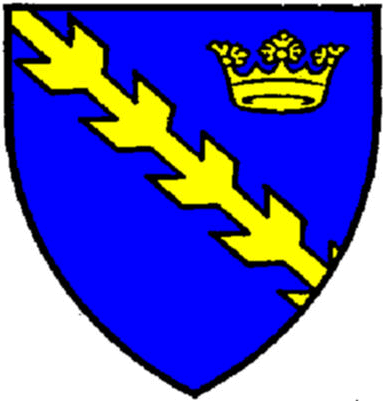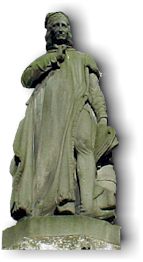
The Marland Family
Jacob van Maerlant - mediaeval poet
 The
greatest Flemish poet of the Middle Ages
The
greatest Flemish poet of the Middle Ages
Born about 1235; died after 1291. Of his life little is known. His
name he seems to have derived from Maerlant on the island of Voorne,
where he lived for some time employed as a sexton, whence his surname
"de Coster". Later he resided at Damme, near Bruges, where, according to
tradition, he held the position of town-clerk. Maerlant's earliest works
were chivalrous romances, such as were in vogue at that time in courtly
circles, and were adapted from French or Latin sources. Such are "Alexanders
Geesten" (written c. 1257), from the Latin of Gauthier de Chastillon; "Historie
van den Grale" and "Merlijns Boeck" from the French of Robert de Borron:
the "Roman van Torec", from a lost French original; and the "Historie
van Troyen" (ab. 1264), from the French of Benoit de Sainte More. But
this kind of literature was little to his taste, which inclined to the
didactic and useful. So he turned his back on the lying romances, as he
called these works in his "Rijmbijbel", and devoted his talent to poems
of a didactic and moralizing character. Among the most note-worthy of
these poems are "Heimlicheit der Heimlicheden", a treatise on politics,
adapted from the pseudo-Aristotelean "Secreta Secretorum"; "Der Naturen
Bloeme" a versified natural history based on the "De natura rerum" of
Thomas of Cantimpré, and the famous "Rijmbijbel", a rhymed Biblical
history, translated from the "Scholastica" of Petrus Comestor, with a
continuation "Die Wrake van Jherusalem", adapted from the history of
Josephus. He also translated a "Life of St. Francis" (Leven van St.
Franciscus) from the Latin of Bonaventure. Maerlant's most extensive
work is the "Spiegel Historiael", a rhymed chronicle of the world,
translated from the "Speculum historiale" of Vincent of Beauvais. It is
dedicated to Count Floris V and was begun in 1283, but was left
unfinished at the poet's death. Continuations were given by Philip
Utenbroeke and Lodewijc van Velthem, a Brabant priest.
Maerlant is also the author of a number of strophic poems, which date
from different periods of his life. Of these the best known is the "Wapene
Martijn" (Alas! Martin) so called from the opening words. It is a
dialogue on the course of events held between the poet himself and a
character named Martin. Altogether there are three parts, of which the
above-mentioned is the first. The other two parts are known as "Dander
Martijn" (the second Martin) and "Derden Martijin" (third Martin).
Other poems of this kind are "Van ons Heren wonden", a traslation of the
hymn "Salve mea! o patrona"; "Die Clausule van der Bible", an
allegorical poem in praise of the Blessed Virgin; the "Disputacie van
onser Vrouwen ende van den helighen Cruce", which bewails the sad
situation of the Holy Land. Maerlant's last poem "Van den Lande van
Oversee" was written after the fall of Acre (1291) and is a stirring
summons to a crusade against the infidels, with bitter complaints about
abuses in the Church. The "Geesten" were edited by Franck (Gröningen,
1882); the "Heimlicheit, etc.", by Clarisse (Dordrecht, 1838) and by
Kausler (1844); "Der Naturen Bloeme" by Verwijs (Gröningen, 1878); the "Rijmbijbel"
by David (Brussels, 1858-69), the life of St. Francis by J. Tideman
(Leyden, 1848); the "Spiegel Historiael" by de Vries and Verwijs
(Leyden, 1857-63). Complete editions of the strophic poems were given by
E. Verwijs (Gröningen, 1880) and by J. Franck and J. Verdam (Gröningen,
1898).
From:
The Catholic
Encyclopedia, Volume IX
See also:
Wikipedia
| Webmaster: Andrew Gray |
Edited: 18 December 2015 |